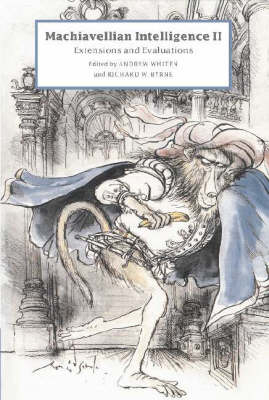
Machiavellian Intelligence II
Cambridge University Press (Verlag)
978-0-521-55949-2 (ISBN)
How can the intelligence of monkeys and apes, and the huge brain expansion which marked human evolution be explained? In 1988, Machiavellian Intelligence was the first book to assemble the early evidence suggesting a new answer: that the evolution of intellect was primarily driven by selection for manipulative, social expertise within groups where the most challenging problem faced by individuals was dealing with their companions. Since then a wealth of new information and ideas has accumulated. This new book will bring readers up to date with the most important developments, extending the scope of the original ideas and evaluating them empirically from different perspectives. It is essential reading for reseachers and students in many different branches of evolution and behavioural sciences, primatology, and philosophy.
Preface; 1. Machiavellian Intelligence Richard W. Byrne and Andrew Whiten; 2. Friendships, alliances, reciprocity and repair Marina Cords; 3. Why Machiavellian Intelligence may not be Machiavellian Shirley C. Strum, Deborah Forster and Edwin Hutchins; 4. Social intelligence and success: don't be too clever in order to be smart Alain Schmitt and Karl Grammer; 5. Minding the behaviour of deception Marc Hauser; 6. The Machiavellian mindreader Andrew Whiten; 7. Exploiting the expertise of others Anne Russon; 8. Primates' knowledge of their natural habitat: as indicated in foraging Charles R. Menzel; 9. Evolution of the social brain Robert A. Barton and Robin Dunbar; 10. The modularity of social intelligence Gerd Gigerenzer; 11. The technical intelligence hypothesis: an additional evolutionary stimulus to intelligence Richard W. Byrne; 12. Protean primates: the evolution of adaptive unpredictability in competition and courtship Geoffrey Miller; 13. Egalitarian behaviour and the evolution of political intelligence Christopher Boehm; 14. Social intelligence and language: another Rubicon Esther Goody; Index.
| Erscheint lt. Verlag | 25.9.1997 |
|---|---|
| Zusatzinfo | 2 Tables, unspecified; 13 Line drawings, unspecified |
| Verlagsort | Cambridge |
| Sprache | englisch |
| Maße | 153 x 228 mm |
| Gewicht | 789 g |
| Themenwelt | Geisteswissenschaften ► Psychologie |
| Naturwissenschaften ► Biologie ► Evolution | |
| Naturwissenschaften ► Biologie ► Zoologie | |
| ISBN-10 | 0-521-55949-9 / 0521559499 |
| ISBN-13 | 978-0-521-55949-2 / 9780521559492 |
| Zustand | Neuware |
| Informationen gemäß Produktsicherheitsverordnung (GPSR) | |
| Haben Sie eine Frage zum Produkt? |
aus dem Bereich


